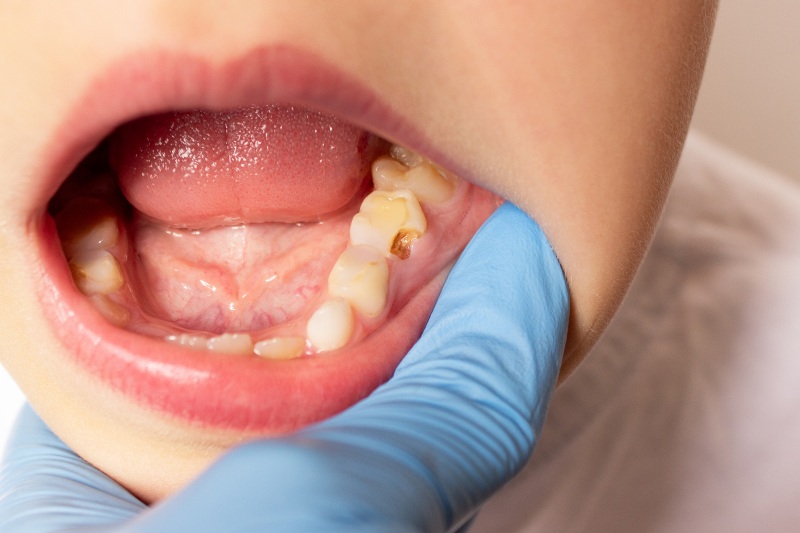602-954-8200
What Are Those Strange Chips in Your Mouth?
December 9, 2024

Have you ever been munching away when you suddenly encounter an unexpected crunchy bite? It’s easy to assume it came from something you ate, but what if the culprit is actually your teeth or gums? Take a closer look at where these hard bits may be coming from and whether you should be concerned about your oral health.
Reasons for Those Strange Chips in Your Mouth
From tartar breaking off back of teeth to tooth fractures or loose fillings, mysterious hard objects might appear in your mouth for several reasons. Here are the most common ones.
Dislodged Tartar
Tartar, also known as dental calculus, is hardened plaque that builds up on your teeth over time. While it usually stays put until a dental professional removes it, small pieces can occasionally break off. These fragments might feel like gritty particles in your mouth. Regular dental cleanings prevent tartar buildup and the unexpected surprises it can bring.
Bone Spicules
After a tooth extraction, tiny bone fragments called spicules may emerge as the jawbone heals. If these small, sharp pieces work their way to the surface, they may feel like slivers in your mouth. Bone spicule after tooth extraction is a result of the body’s natural healing process after tooth extraction. While they often resolve on their own, persistent discomfort warrants a dentist visit for evaluation and possible removal.
Tooth Breakage
Biting down on something hard or experiencing facial trauma can cause a tooth to chip or fracture. Depending on the severity, a small fragment or a significant portion of the tooth may break off. It’s crucial to see a dentist promptly to assess the damage and determine the appropriate treatment, which may include bonding, crowns, or other restorative procedures.
Loose Fillings or Other Restorations
Over time, dental fillings, crowns, bridges, or veneers may wear down, loosen, or even fall out. Restorations can come loose due to changes in the underlying tooth structure or improper bonding. When this happens, you might find a sharp or hard fragment in your mouth. Loose or missing dental work exposes the treated area to decay and sensitivity. Schedule a dentist appointment for a repair or replacement to avoid further damage to your teeth.
Are Small Chips in Teeth Normal?
Minor chips are relatively common and can result from something as simple as chewing hard food or biting down wrong. Your teeth are more likely to chip during everyday activities if your enamel is thin and fragile due to erosion or tooth grinding.
While tough, enamel gradually wears down when exposed to acidic foods, sugary drinks, or conditions like acid reflux. Unlike bone, enamel doesn’t regenerate, so protecting it is crucial. If you notice increased sensitivity or a translucent appearance at the edges of your teeth, consult your dentist about fluoride treatments or dietary changes to fortify the remaining enamel.
Tooth grinding, also known as bruxism, is another condition that increases the chance of chipping. The repetitive grinding motion puts excessive pressure on your teeth, weakening their structure. This may lead to small chips, cracks, or even loose teeth. Many people don’t realize they grind their teeth until the damage becomes evident. Dentists often recommend custom mouthguards to protect your teeth from further harm.
Does Chipping a Tooth Hurt?
Chipping a tooth can hurt, but the pain depends on the severity of the chip and which part of the tooth is affected. For minor chips that only affect the enamel, you might not feel any pain at all. The tooth surface may feel rough, but the lack of nerve endings means you probably won’t notice it right away. However, if the dentin layer beneath the enamel is exposed, you may experience sensitivity to hot, cold, or sweet foods. This is because dentin contains microscopic tubules that connect to the nerve, transmitting sensations directly to it.
Chips or fractures that reach the pulp, where the tooth’s nerve and blood vessels are located, are much more severe. Your discomfort may range from a dull ache to sharp, throbbing pain, especially when chewing or biting. These cases also increase the risk of infection, as bacteria can infiltrate the exposed pulp. If left untreated, a severe chip may require a root canal or dental extraction.
So, while you might not be in any immediate pain, even a small chip can compromise the tooth’s integrity. Therefore, it’s advisable to have any chip evaluated by a dentist, regardless of its size, to determine if treatment is necessary.
Keep Your Smile Healthy with Biltmore Dental Center
Unexpected dental issues are unsettling. The next time you find a sliver of bone, a lost filling, or a bit of chipped tooth in your mouth, turn to Biltmore Dental Center for help. As an emergency dentist in Phoenix, AZ, we offer same-day appointments to help you avoid further complications. Our team has strong community roots and provides excellent customer service to resolve your dental concerns promptly. Contact us now to describe the issue you’re having, and we’ll schedule your appointment right away.
